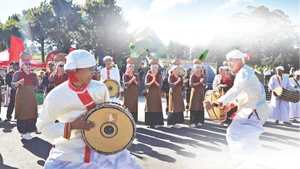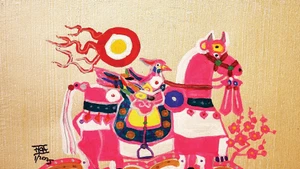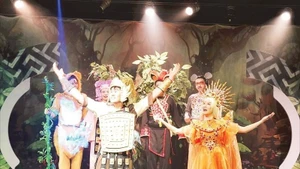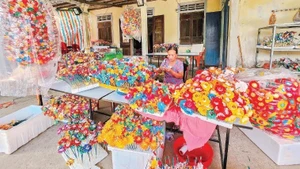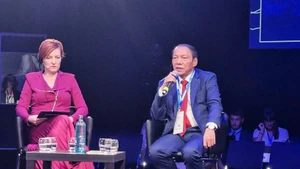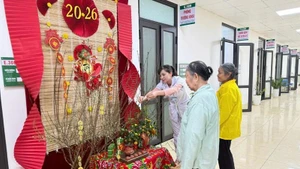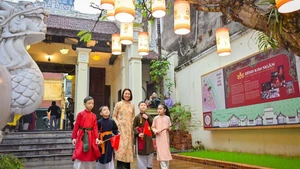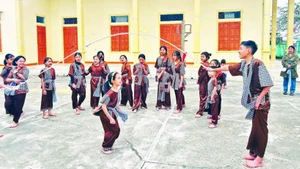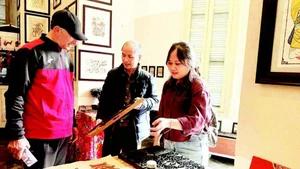Nhan Dan (People) Newspaper held a talk with him to learn more about the project.
Question: You have covered popular songs in your native language, which have received tens of millions of views on YouTube. Can you tell us why you decided to turn to singing and composing songs in your mother language?
Singer Balin: In the beginning, I started singing with instinct as singing is my passion. When I covered songs and become more popular among the public, I was very happy. However, I realised that if I keep covering others’ songs, no matter how well I sing, I would just be their shadow.
Therefore, I studied music by myself. Melodies kept dancing in my head, so I practiced composing songs.
The first song I wrote was about what has gone. After completing the melody for the song, I remembered the folk songs in Jarai language that were sung by the elders when I was a child.
Suddenly, I realised that my generation no longer paid attention to our mother language, and our language and writing are gradually disappearing.
Words then rushed in my head, and I quickly finished the lyrics for the song in the Jarai language.
After completing the song, I held that if I just sang in the Jarai ethnic language, the song would only reach Jarai people. Meanwhile, YouTube viewers come from different ethnic groups across Vietnam, including Overseas Vietnamese, so I translated the lyrics it into Vietnamese.
That was how my first bilingual song was born. Its name in Jarai language is ‘R'Ngot A doi’ (Missing you).
Your songs often target young audiences. Can you share us about their response and feedback to your compositions?
My song ‘R'Ngot A doi’ has been well welcomed by many young people. Some of whom have covered it with passion. The song has also been performed at festivals, parties, and weddings, which makes me very happy!
Not just young people but the village’ elders also love to listen to it. They have praised and encouraged me to write bilateral songs, which help them understand what today’s people sing about.
What are the advantages and disadvantages for you in composing bilingual songs?
People in the Central Highlands love music, and the music of the Central Highlands ethnic groups, including my Jarai tribe, is also very diverse and beautiful. I was born in a land where children grow up with folk songs.
Another advantage of composing bilingual songs is that the Jarai language is easy to listen to as it has very gentle pronunciation.
Regarding difficulties, first, I had to learn music by myself due to unfavourable economic conditions.
The biggest difficulty is in writing lyrics and translating. The Jarai language has a lot of equal tones; however, for several parts in a musical piece, you must use uneven tones in order to reach high notes. When translating, the Vietnamese words that are synonyms of the Jarai words in the song don’t have similar tones, so I must find the word with the same tone and the closest meaning.
What message do you want to convey to the audience in your bilingual compositions?
In addition to preserving the Jarai ethnic language, I also want to inspire young ethnic minorities across of the country to not be afraid to bring their mother languages into music and not be shy to sing in their own languages, because our mother languages are very beautiful and are the demonstration of our culture.
Thank you so much for sharing with us!
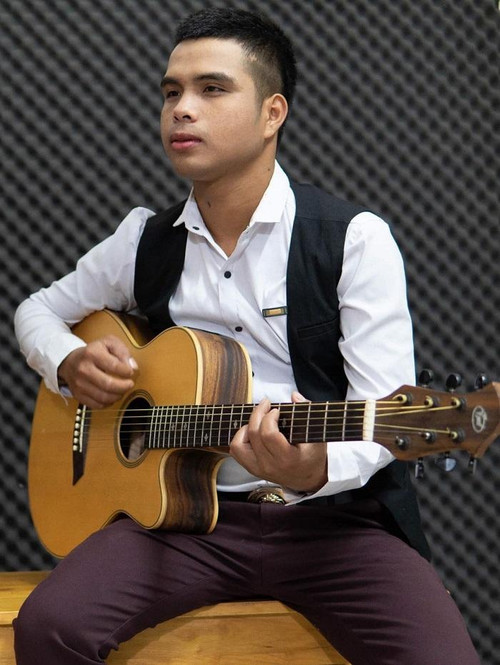 |
Singer Balin, whose real name is Ro Cham Blinh, was born in 1994 in Mrong Yo village, Ia Ka commune, Chu Pah district, Gia Lai province.
He became famous on social networks by covering songs which have reached tens of millions of views.
Balin has composed dozens of bilingual songs, the most popular of which include ‘R'ngot A doi’ (Missing you), ‘Khap A doi na nao’ (Love you forever), and ‘Do cang A doi’ (Still waiting for you).


